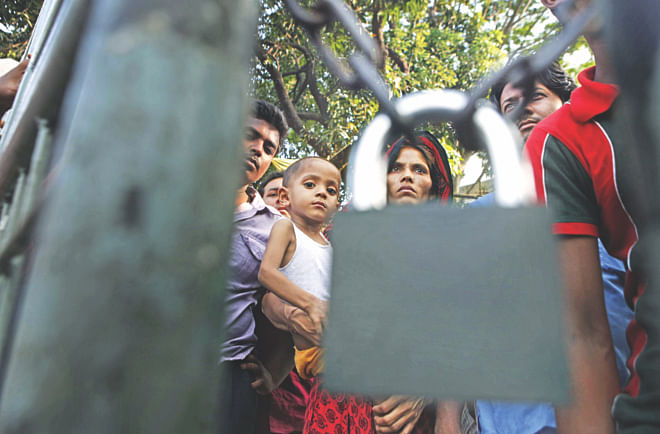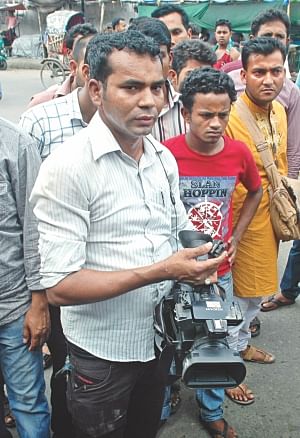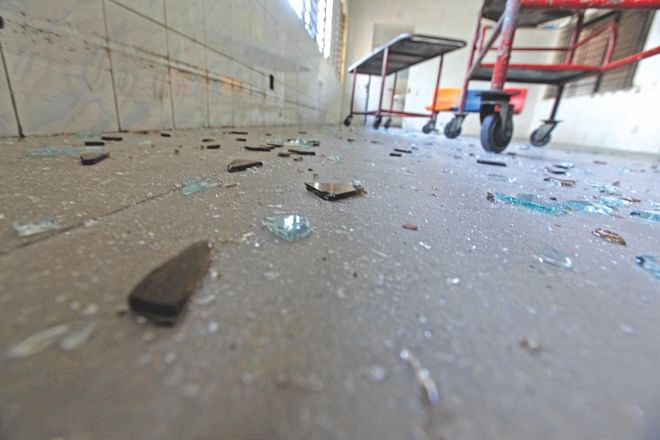Law respected by none

People are being deprived of their fundamental rights of healthcare as doctors are enforcing frequent strikes over issues that could be legally dealt with.
On the other hand, relatives of patients, dying allegedly for doctors' negligence, are often taking matters in their own hands and purportedly assaulting doctors and medical professionals instead of following due procedures of complaining against such incidents.
With little or no steps from the authorities to prevent moves like work abstention which puts patients' lives at stake, doctors enforced strikes over a dozen times last year alone against 50 cases of assaults by patients' relatives, according to Bangladesh Medical Association (BMA).

The issue has become crucial, as confrontations between the patients or their relatives and the doctors have become almost regular now.
Besides yesterday's mayhem over using the lift at Dhaka Medical College Hospital, recently doctors at Birdem Hospital, interns at Mitford Hospital and Rajshahi Medical College Hospital (RMCH) went on strike, following clashes with patients, their attendants or the journalists, who went there to cover incidents of alleged negligence.
In all the cases mentioned above, neither the doctors nor the relatives of the patients followed the legal course. Instead, they resorted to unlawful steps creating total chaos in the institutions. And eventually, the doctors enforced strikes, denying healthcare to the very people they took an oath to serve at all costs.
Most of the 50 incidents of "assaults" last year were triggered by deaths purportedly due to negligence in treatment which doctors denied.
In absence of an effective mechanism to verify the complaints of negligence, the allegations remained unproven and doctors went scot-free in almost every case.
Disregard for the country's prevailing laws reached such a state that the doctors of all the public and private hospitals in Rajshahi enforced a strike on March 27 this year after a court denied bail to a doctor and sent him to jail in a murder case.
The case was filed following the death of a businessman at a private clinic in Rajshahi city less than half an hour after he was taken to operation theatre for a surgery on his fractured right leg on January 30.
During the two-day strike, at least one patient died allegedly for not getting treatment at the RMCH.
According to a study of rights body Ain O Salish Kendra (ASK), a total of 504 incidents of severe medical negligence leading to death or loss of organs were reported between June 1995 and September 2008.
The figure could be much higher if all the incidents had been counted, it says.
However, Bangladesh Medical and Dental Council (BM&DC), the statutory body to investigate such cases, cancelled registration of only three doctors -- two in 1994 and one in 2013 -- for negligence in treatment.
“We hardly get any complaint from the patients. Even if we get, they lack adequate evidences to be proved,” said Dr Zahedul Haque Basunia, registrar of the BM&DC.

Dr Jamaluddin Chowdhury, disciplinary committee member of the BM&DC, said people rarely are aware of the existence of such a council as the statutory body has not yet taken any initiative to publicise that patients or their relatives can complain to it for redress.
The BM&DC Act- 2010 empowers the body to cancel the registration of physicians if they are found guilty of misconduct or violating provisions of the law.
“This provision could be a very effective tool for the BM&DC to ensure accountability in medical profession. But unfortunately, it seems reluctant to recognise negligence as misconduct,” says the 2013 ASK study on medical negligence.
The act also fails to set the standard of care that a medical practitioner owes to the patients. It has a code of ethics, but there is nothing to further explain what amounts to gross negligence and what does not, the study says.
Since it is not possible for the general courts or lawyers to investigate or hold trials of cases of negligence in such a specialised discipline as medical science, the Law Commission sent some suggestions to the health and the law ministries early 2012 in this regard.
It recommended a law, clearly defining medical negligence, and forming special civil courts to deal with cases on such negligence but nothing has yet been done, said Dr Shah Alam, a member of the commission.
BMA Secretary General Dr Iqbal Arslan said there is standard operational procedure (SOP) for the treatment of a few diseases only.
He also held it important to develop SOPs for all major diseases, saying this would help determine medical negligence.
“People consider doctors as persons of higher standards, but problems arise when their expectations are not met,” he added.

 For all latest news, follow The Daily Star's Google News channel.
For all latest news, follow The Daily Star's Google News channel. 



Comments